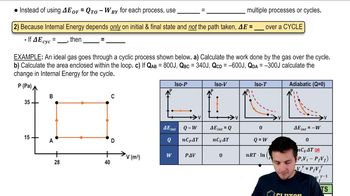Here are the essential concepts you must grasp in order to answer the question correctly.
Otto Cycle
The Otto cycle is a thermodynamic cycle that describes the functioning of a gasoline engine. It consists of four main processes: adiabatic compression, isochoric heat addition, adiabatic expansion, and isochoric heat rejection. Understanding this cycle is crucial for analyzing the efficiency and work output of the engine, as it illustrates how energy is converted from fuel into mechanical work.
Recommended video:
Adiabatic Process
An adiabatic process is one in which no heat is exchanged with the surroundings. In the context of the Otto cycle, both the compression and expansion strokes are adiabatic, meaning that the temperature and pressure of the gas change without heat transfer. This concept is essential for calculating the work done during these strokes, as it influences the internal energy of the gas.
Recommended video:
Entropy & Ideal Gas Processes
Isochoric Process
An isochoric process occurs at constant volume, meaning that the gas does not expand or contract during the process. In the Otto cycle, the combustion of the fuel-air mixture happens during an isochoric process, where heat is added to the gas without changing its volume. This concept is important for understanding how the pressure and temperature of the gas increase rapidly, leading to the subsequent power stroke.
Recommended video:
Properties of Cyclic Thermodynamic Processes
 Verified step by step guidance
Verified step by step guidance Verified Solution
Verified Solution

